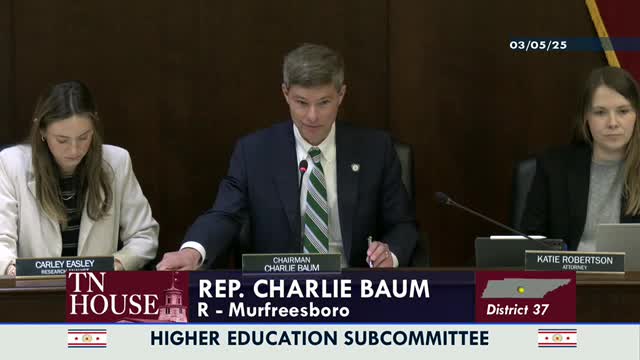Higher Education Subcommittee advances bill to extend Ben Ashley supplemental awards to Western Governors University
Get AI-powered insights, summaries, and transcripts
Subscribe
Summary
The Higher Education Subcommittee voted 4-1 to advance House Bill 645, which would make Western Governors University eligible for the Ben Ashley supplemental component of the Tennessee Student Assistance Award; staff warned the program is fully subscribed and the fiscal note is about $2 million.
The Tennessee House Higher Education Subcommittee voted 4-1 to advance House Bill 645, a measure to add Western Governors University to the list of institutions eligible for the Ben Ashley supplemental award that augments the Tennessee Student Assistance Award (TSAA).
Sponsor Chairman Garrett, a member of the Higher Education Subcommittee and the bill’s sponsor, told the committee the bill would open state scholarship dollars to working adults who attend WGU and similar competency-based programs. "This legislation comes to me from Western Governors ... it opens up an opportunity that folks that are working, they may have kids," Garrett said, describing the institution as an online option for nurses and teachers.
The measure matters because the Ben Ashley component is an augmentation to the TSAA targeted at low-income students attending private institutions. Lou Hanneman of the Tennessee Higher Education Commission (THEC) and the Tennessee Student Assistance Corporation (TSAC) told the committee the TSAA appropriation is roughly $113 million and is fully subscribed in typical years. "As I understand, this has a little over a $2,000,000 fiscal note, which again represents those would be 1,200 students who otherwise would have received this award," Hanneman said.
Hanneman told members the money for the TSAA and its Ben Ashley supplement comes from the general fund, not lottery proceeds, and that awards are distributed on a first-come, first-served basis. He warned that adding WGU to the supplemental eligibility would shift a portion of a fixed pool to WGU students: "If we add WGU, then that means dollars that go to WGU would be dollars that wouldn't go to a student at another private university like Carson Newman or Vanderbilt or Lipscomb."
Representative Glenn said he would support the bill but asked for further study in subsequent committees to ensure the change would not harm students at public institutions. Hanneman reiterated that WGU students already qualify for the base TSAA award; the bill concerns only the additional Ben Ashley supplement.
Action and next steps: the committee clerk recorded 4 ayes and 1 nay; the bill was reported out to the full Education Committee.
Why it matters: Supporters argued the change increases access for working adults — an average age of about 33 was cited for WGU enrollees — and helps fill workforce needs such as nursing and teaching. Opponents and staff cautioned the change draws from a fully subscribed, recurring general fund pot and carries a recurring fiscal impact of roughly $2 million unless the legislature increases the TSAA appropriation.
Votes at a glance House Bill 645 — Advance to full Education: 4 ayes, 1 nay. Fiscal note: approximately $2,000,000 recurring (staff estimate).
